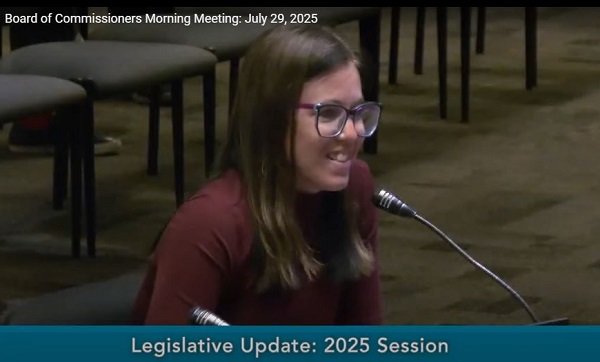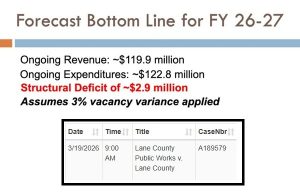Lane County looks back at the 2025 legislative session
6 min read
Presenter: With the commissioners July 29 for a look back at the 2025 legislative session, Lane County’s Intergovernmental Relations Officer Vanessa Cornwall:
Vanessa Cornwall (Lane County, intergovernmental relations officer): As far as some session highlights, we did get our full funding ask for the Stabilization Center, and that would not have been possible without your advocacy and without the advocacy of our delegation in Salem. They made it their highest funding priority ask for this session and it was critical in working with leadership to make sure that it was added to the final end-of-session omnibus or a ‘Christmas tree bill,’ if you are so inclined.
[00:00:45] We also saw some local investments in that final omnibus for the city of Eugene and their Clear Lake economic development initiative. Oakridge got some funding for the Oakridge Community Health and Medical Services Center, which will be located at the Willamette Activity Center. Cottage Grove received some funding for some accessibility upgrades to the Armory Building, and then the city of Veneta received some much-needed funding for their wastewater infrastructure upgrades.
[00:01:18] As far as some of the top line bills: HB or House Bill 2005 was a major package aiming to improve access to mental health and substance abuse disorder treatment by establishing diversion opportunities and alternative treatment plans…
[00:01:40] We also saw the inception of the Oregon Public Safety Coordination Grant Program; the ‘One Grant To Rule Them All,’ which gives the Criminal Justice Commission the responsibility for reorganizing most individual public safety grant programs like IMPACTS and now deflection.
[00:02:07] Lane County also received two new circuit court judge positions, thanks to the advocacy from Judge McAlpin, and the legislature did also grant an increase to salaries for circuit court judges in order to compete with neighboring state pay scales.
[00:02:29] We did also see a change for behavioral health resource networks or BHRNs and the grant administration for that program. This transfers the responsibility to Oregon Health Authority specifically for where the funding goes; who gets what all that good stuff.
[00:02:50] We saw the statewide shelter program enacted to permanent status, which sets up the regional coordinators to administer funding to shelter providers.
[00:03:02] We also saw some changes to the Medicaid budget and due to some of the federal uncertainty around how much the state was going to receive from the feds.
[00:03:15] Presenter: Lane County Policy Director Steve Adams:
[00:03:17] Steve Adams (Lane County, policy director): We had a presidential transition in January, and we’ve had a very active presidency in the few months since. We’ve had a rather large volume of executive orders coming from the White House. We’ve had lot of discontinuities in previous policy positions… and so there was a lot of uncertainty coming into the legislative session as members came in with a certain set of priorities, they were really trying to kind of understand at the same time what was going to happen at the federal level and factor that into the state level.
[00:03:54] Presenter: For example, Oregon set aside half a billion dollars for health programs. Vanessa Cornwall.
[00:04:01] Vanessa Cornwall (Lane County, intergovernmental relations officer): Over $500 million was withheld specifically for the Healthier Oregon Program as a special-purpose appropriation to account for expected federal reductions. And some additional funding was set aside for aid and assist services and funding for grants that oversee behavioral health permanent supportive housing programs.
[00:04:28] And for the Oregon Department of Human Services, they increased the budget for intellectual and developmental disability program by 5% due to rising caseloads and costs and expected declining federal Medicaid match. So they’re trying to account for some of the differences we’re not going to see in the federal funding coming down the pipeline.
[00:04:54] We did see the legislature move to establish a task force to address the issues with Measures 5 and 50 with a report from the legislative revenue officer due at the end of this year.
[00:05:07] And then we were successful in getting some help to the Mapleton Water District and the Mapleton Sewer District, specifically by expanding the justifications for a domestic water supply district to exercise the powers of a sanitation district under an ORS established for Blue River after the holiday fire. The original legislation granted authority to a water district to assume the authority of a sanitation district in the event of a public health emergency.
And as you know, the Mapleton Sewer District, which is run by a public charity, the Mapleton Commercial Area Owners Association (MCAOA), is severely financially constrained. And being a public charity, they’re unable to qualify for state or federal assistance via grants.
So we worked with the Mapleton Water District, the MCAOA, and Rep. (Boomer) Wright to expand the justification under the specific ORS so the districts can work through the process of becoming a single district.
Our vice chair, Commissioner (Ryan) Ceniga, testified to that bill specifically and we thank you for your work on that.
[00:06:29] Due to the Office of Economic Analysis forecast, which was released in April, the projected adult-in-custody population was reduced quite drastically and the anticipated growth projected in 2024 was no longer expected. So the community corrections budget was reduced by almost $33 million. This funding is based on the capitation rate for how much it costs counties to house adults in custody.
[00:07:04] We were expecting an increase based off of the time study funding that was outlined in 2017 which would have brought up the amount to handle those individuals to just over $18 a day. But that was not adopted. Some counties have announced what they intend to do due to this funding decrease and we’re hoping that the legislature will kind of go back and review some of those decisions that they made.
[00:07:39] Other key bills that we saw going through the final days in session was a building code and mapping requirement change for wildfire hazard mitigation. Those building code standards and mapping requirements were eliminated.
[00:07:58] And then we did see one of the more contentious bills go through the legislative session. One was a Senate bill that guarantees unemployment benefits for striking workers. The initial text included 26 weeks of eligibility for striking workers to receive benefits, but that was reduced down to 10 weeks based off of some of the legislation enacted in Washington State.
[00:08:28] We also saw the study bill get enacted to study solid waste in the Willamette Valley. This will have a task force of 12: Four will be appointed by House and Senate leadership; eight will be appointed by the governor; and then at least two seats will be held by environmental organizations.
[00:08:49] Presenter: Steve Adams:
[00:08:52] Steve Adams (Lane County, policy director): Without Ms. Cornwall’s diligent work, we would not have had anywhere near the success that we had this session.
[00:09:02] Presenter: Vanessa Cornwall:
[00:08:59] Vanessa Cornwall (Lane County, intergovernmental relations officer): So there were a few priorities that didn’t pass. We will see the CAFFA funding fix come back in the short session. So we’ll likely see that get pushed through in the final short session and then our CleanLane supersiting bill, which was brought in very late, did not make it across the finish line or out of House Rules (Committee) due to some time constraints.
[00:09:27] And then finally, this was a transportation year. We were expecting at least something to come through and there were a variety of some things that were introduced but ultimately did not make it through.
[00:09:40] It was very dramatic on the final day of session—a lot of pausing to see whether or not they were going to be able to get the votes to move it forward. Ultimately it did not and a special session has been scheduled for Aug. 29 to address the funding issues that ODOT is experiencing with announced layoffs.
[00:10:02] Presenter: After the long session, Lane County’s Intergovernmental Relations team hopes for a second chance to reform CAFFA, the county assessor function funding assistance, when the legislature convenes a special session at the end of the month.





